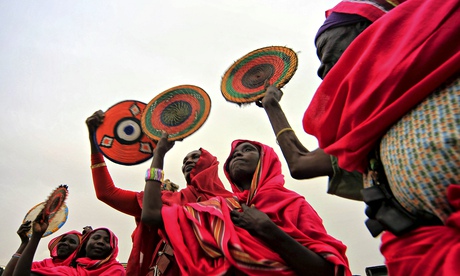Women, Peace & Security
Source: The Guardian
Sudanese women contribute greatly to their communities during war, but they have been left out of the formal peace process
The 22-year-conflict in Sudan, which consumed so much of the country's resources, ended with the secession of South Sudan to become an independent country in 2011, and the fighting played a major role in hindering women's empowerment in Sudan.
Given the importance of empowering women in the country, the UN Development Programme hopes to emphasise gender equality throughout its activities and is helping its national partners to identify and implement a sound strategy in order to promote gender equality and development in Sudan. As in any other society, women's educational and socioeconomic status is expected to positively influence their participation in peace processes and the renovation of peace-building.
However, interviews with female leaders in Darfur (who are mainly educated, politically active and peace advocates) reveal that they do not believe that their male counterparts value their roles as peacemakers. This sentiment is shared by lower-ranking women who are loyal to the ruling regime. Rural women who are devoid of any protection or source of income and live in war-torn areas, relinquish themselves entirely to their men, "the protectors", thus subordinating their role as actors, for example, by singing songs to encourage men to fight the enemies of the nation and protect the lives of women.
Although women's civil-society organisations and female activists contribute greatly to maintaining the cohesion of their communities when crises occur, and especially during times of war, Sudanese women have incessantly been excluded from the formal peace processes and initiatives.
For example, many women's organisations were registered as observers and presented their views in technical papers during peace negotiations, yet they were not formally involved in the peace process. During the peace talks between the north and the south in 2005, the Sudanese government prevented some women from boarding a plane in an effort to bar them from participation in the talks. Women throughout the country formally gathered to protest against the government's actions.
In an address to the World Bank in 1999, the UN secretary general at the time, Kofi Annan, cited a study conducted by the UN University showing that inclusive government is the best guarantor against internal violent conflicts. The study points out the dangers of "horizontal inequality", where power and resources are inequitably distributed among groups differentiated by race, religion or language. This leads to ethnic conflict, when one group feels it is discriminated against or, conversely, is privileged in ways that it fears it might lose. The solution for peace is the presence of "inclusive democracy", where every person has a chance to participate in decisions that affect their lives.
As part of inclusive democracy, reducing unequal gender hierarchies would make a positive contribution to peace and social justice. Women have specific needs, priorities and strategies that must be included in peace agreements to guarantee the fulfilment of these needs and strategies during the implementation of the agreements.
In Sudan, many women's groups and organisations are involved in peacebuilding on both sides of the conflict. All these organisations work in varying capacities to empower women to be involved in the peace process and in peace-building. Their work has been explained by many scholars as a movement towards a "gendered" peace process. The work of these organisations faces many obstacles, including the diversity of issues they have to address, ranging from HIV-Aids to violence, governance and poverty, all of which are either consequences of war or are complicated by it.
 Women participate in a peace rally in the town of al-Fashir, north Darfur, in 2013.
Women participate in a peace rally in the town of al-Fashir, north Darfur, in 2013.
Photograph: Mohamed Nureldin Abdallah/Reuters
Other obstacles faced by the women's movement include the lack of common strength and cohesiveness in rallying around women's issues after the signing of Sudan's comprehensive peace agreement, which ended the north-south civil war, and the Darfur peace agreement. This led to much frustration among women and raised many questions, causing women to wonder what further capacity-building efforts were needed. Issues such as the lack of qualified leadership, commitment to women's issues, professional skills (advocacy, lobbying and presentation), accountability, ownership, and the link between research and activism have all been identified as problems.
Although they had found unity within their gender with regard to women's issues, and worked diligently to lobby for female representation as equal partners at the negotiating table, women were unable to unify themselves across their political differences, which prevented them from forming one persuasive team of female delegates to deliver and negotiate the specific needs of women.
